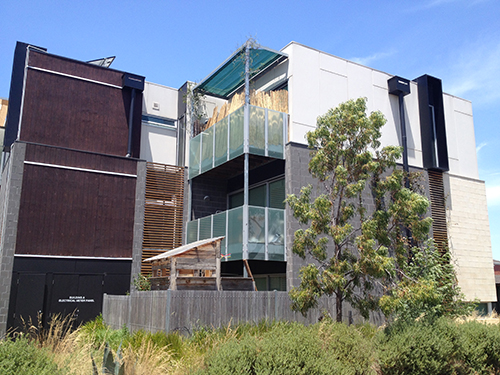New Australian Research Council Grant to Help Prevent Social Isolation Through Innovative Housing Models
 Murundaka Cohousing Community (opens in a new window), Heidelberg Heights, Melbourne. Photo by Louise Crabtree.
Murundaka Cohousing Community (opens in a new window), Heidelberg Heights, Melbourne. Photo by Louise Crabtree.
Western Sydney University has been awarded an Australian Research Council (ARC) Linkage grant worth $594,268 (including partner contributions) to investigate the benefits of housing cooperatives as an alternative housing option in Australia.
Following the success of housing cooperatives overseas, the project will provide valuable data on the viability of this model as an affordable, accessible and socially beneficial solution to Australia’s growing housing crisis.
Associate Professor Louise Crabtree, lead researcher from the University’s Institute for Culture and Society, says cooperatives can provide a vital third choice for Australians whose current options of expensive home ownership or rental insecurity are leaving many at risk of homelessness.
“Housing in Australia continues to be unaffordable for many people,” she says.
“Growing numbers of Australians are trying to make a long-term home in a rental system that is geared towards short-term tenancies, or are becoming homeless. Further, as our population ages, we face increasing risks of homelessness and isolation among older people.”
The research team will work with the Australian Cooperative Housing Alliance to support the development of stable and affordable homes that benefit not only residents, but also wider society, explains Associate Professor Crabtree.
“Australia has a small housing cooperative sector that is poised for growth.”
“In other countries, housing cooperatives have been associated with a range of benefits for residents due to their focus on community involvement – including better quality housing, greater social networks, improved senses of belonging, and improved employment and education outcomes.”
By demonstrating the value created by alternative forms of housing, the research will assist the sector to move more Australians into secure and affordable homes.
“This research will test the claim that housing cooperatives provide a range of benefits for their residents that extend beyond housing, providing an evidence base for housing cooperatives and a way to track the social benefits of other forms of housing as well,” says Associate Professor Crabtree.
The grant includes financial and in-kind contributions by partner organisation the Australian Cooperative Housing Alliance with additional in-kind contributions by Western Sydney University, The University of Newcastle and Swinburne University of Technology.
The ARC’s prestigious Linkage program is designed to promote national and international research partnerships and transfer knowledge, skills and ideas.
Articulating Value in Housing Cooperatives
Researchers: Associate Professor Louise Crabtree (Institute for Culture and Society, Western Sydney University), Dr Neil Perry (School of Business, Western Sydney University), Dr Sidsel Grimstad (The University of Newcastle), Associate Professor Wendy Stone (Swinburne University of Technology), Dr Emma Power (Institute for Culture and Society and School of Social Sciences, Western Sydney University).
Partner organisation: Australian Cooperative Housing Alliance.
Project summary: Australia has a persistent shortage of affordable, quality housing. Housing cooperatives are member-based organisations providing rental and owner-occupied homes to members. They are associated with benefits for member-residents, including improved housing, improved senses of belonging and community, and employment and education outcomes. However, evidence for those benefits has gaps, so this study aims to develop a framework for assessing housing cooperative benefits and to develop a typology to identify the factors shaping those benefits. The project outcome will be an evidence base of what works in cooperative housing, which can benefit the country by providing a rationale for growth of and policy support for socially beneficial housing.
Total project value (cash and in-kind contributions): $594,268.
ENDS
21 May 2020




